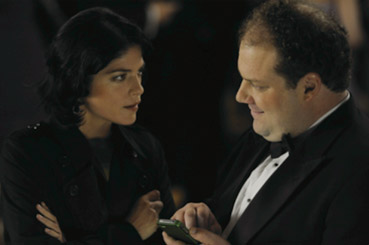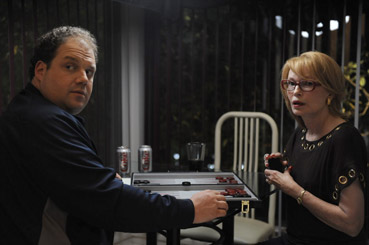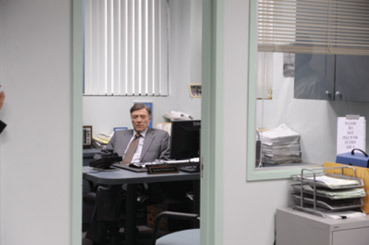|
Life During Wartime, Todd Solondz's previous feature, briefly had the working title Forgiveness, and chronicled a chorus of pariahs' failed attempts at redemption. Though never straying remotely close to touch-feely handholding, for the first time in his career, the director's usual assortment of over-privileged outcasts were looking outward from their algae-ravaged goldfish bowl, trying for just a second to peer past their own solipsism—and failing in impressive, tragicomic fashion.
"I never knew I would care about people" deplores soon-to-be-married Miranda (Selma Blair) in a rare moment of over-medicated clarity. Such offhand egocentrism is common to all of Solondz's grotesques, whose disproportionate sense of entitlement renders them life's whiniest bystanders. That they could even care about caring attests to their daily fear of wholeheartedly committing to life. When Abe (Jordan Gelber) tells Miranda he's often thought of committing suicide, her brittle response is aimed as much at herself as it is him. "Do it or shut up" she barks, noting that suicide is far more commendable than watching life pass you by.

With Dark Horse, it's very much evident that Solondz has switched back to the de facto view of his characters: little more than garish derision, the lack of which made Life During Wartime's meagre remissions so noteworthy. The quasi-sequel amounted to so much more than what glib critics wrote of as Happiness' re-heated leftovers. In Wartime, a newly released paedophile tracks down his now grown son at college, trying to convey how sorry he is for his unforgivable indiscretions. From the moment he sets foot in the dorm room, it's painfully apparent there's no hope at all for them to rekindle any kind of relationship. Even so, this paltry stab at reconciliation is a deliberate effort to atone; just one example of remorseful adults coming to terms and actively trying to be better versions of themselves instead of lazily yearning for a change in circumstance. By contrast, the characters of Dark Horse don't actively try anything – even yearning seems pointless and exhausting. Giving up on a literary career and returning home to live with her parents, Miranda recounts how she's lost ambition and self-respect with preposterous enthusiasm, wearing her laundry list of failures as though they were a badge of honour. Agreeing to marry Abe (under the duress of heavy medication) proves a final act of towel-throwing: a final abandonment of the life she really wanted, but never tried for.
Perhaps emboldened by the experiment of Palindromes, Solondz auspiciously decided Life During Wartime would revisit characters he'd established twelve years prior in Happiness by re-casting all the parts. New faces would allow the possibility of giving these despicable people a second chance, but Solondz's attempt at casting a wider emotional net was largely met with accusations of treading water. Critics who years ago were falling over themselves to praise his work now seemed to have turned their backs on him, and if the general reaction at this year's LFF screenings of Dark Horse are anything to go on, many aren't even willing to bother trying anymore.
With that in mind, Dark Horse can't help but read as a bitter response to the criticisms of Life During Wartime. As if to make up for any hint of 'kindness' in his last picture, Solondz has turned the vitriol up to eleven – only fitting, since the characters of Abe's world might struggle to find the word kindness in the dictionary. As early reviews started coming in from Toronto, the completely unfounded consensus floating in the blogosphere is that for his latest celebration of American complacency, Solondz has gone soft – far from it. Dark Horse proves he's still America's premiere misanthrope. The radical difference is that, unlike previous films, where he doled out arsenic in small doses across a sprawling ensemble, this time he's chosen to focus all his cosmic contempt for humanity on the slovenly shoulders of a single self-proclaimed "dark horse," Abe.

A case in point: in every previous Solondz film, the protagonist's parents are hideously attired, middle class Jewish caricatures, and while Christopher Walken's Jackie is saddled with supercuts hair and eyesore-neon tracksuits, he wears them well enough. Kurt and Bart's costume design for Phyllis (Mia Farrow) even goes as far as making her look quite stylish. Mum and Dad aren't the usual sideshow freaks this time, just people who don't know any better. The only character Solondz seems intent to ridicule and make suffer is Abe, never missing a chance to remind the audience just how big of a loser he really is. For those who delight in seeing Solondz poke, frustrate, and thwart his character's plans at every turn, Dark Horse is possibly his cruellest picture yet.
Seemingly everyone at the LFF press screening I attended complained about the lack of story or inciting dramatic action, surely collective failure on their part to grasp the film's primary enterprise? As a motor for a series of unfortunate events, the plot only goes as far as it needs to, Solondz's sole intent to viciously set upon his protagonist, kicking him in the teeth compulsively and without joy. What could be more dramatic than a guy unable to get up off his knees for eighty minutes, as every attempt sees him beaten back down?
That Dark Horse is so caustic is interesting, since Solondz – by his own admission – wanted to make a film straying away from the taboo-breaking subjects he's become associated with (paedophilia, rape, abortion, etc) and make something somewhat more acceptable in the mainstream. Every aspect of the presentation supports this. The compositions by Andrij Parekh (Half Nelson, August) are immaculately lit with rom-com polish. Following Wartime's sickly Floridian pastels (it was easily his ugliest film), Solondz presents something that looks remarkably like the now de-jour man-child comedy. Leading man Jordan Gelber looks himself like a cross-breed of Seth Rogen and Kevin James, and were it not for Solondz's name on the credits you'd be forgiven for thinking you'd wandered into the most recent multiplex assemblage of coarse, vulgar poop jokes. Get close enough to scratch that glossy surface though, and, sure enough, it bleeds acid. If Dark Horse constitutes Solondz's effort to repress those urges that come most naturally to him, then his helplessness to do so gives devotes reason to rejoice.
If this, as many have exaggerated, is Solondz 'going mainstream', fear not, for Abe looks nothing like Ryan Renyolds and we're in no danger of life lessons being learned at the end. Grossly overweight, badly dressed and still living with his parents in his mid-thirties, Abe is looking for love with the woman who ‘deserves him', while nursing major resentment at both his brother's success and not being able to play outside his league. He's an adolescent fantasist with no grasp of how he or his lifestyle are perceived, Abe spends his days reluctantly working for his father, misspending his time browsing eBay spending obscene amounts of money on Thundercats figures when he ought to be finishing spreadsheets. His always quivering, obese frame is the inescapable poker tell that lets us know he's barely holding it together, despite his larger than life capacity for delusions of grandeur. A bluster of hot air he foolishly thinks people mistake for confidence, Abe's inflated sense of his own importance, talents, and false sense of pride in his character make him an unlovable figure of mockery. "I'm too old for American Idol" he laments, putting it down to cosmic bad luck rather than the fact he has no aptitude for singing. Riding round in his yellow tank of a car, belting out the lyrics to gag-reflex pop songs, Abe actually buys into their message of hollow-self-empowerment, believing himself to be a beautiful, unique snowflake whose life actually matters. What these pop songs in fact describe is an Olympian mountain of all he'll never amount to, charting his feelings of inadequacy, which are endless and unrelenting. As Abe drives around, Solondz captures a torpid sense of LA's anonymity under eye-searingly bright skies; the impersonal proliferation of strip malls, multiplexes, and freeways, across which dead souls inch along in metal coffins.

"I didn't even do anything. It's not my fault" is the common refrain of this mollycoddled nincompoop. Abe would have us believe that it's him against the world, and that everyone has it in for him, and yet, both his mother and work colleague Marie (Donna Murphy) are forever pledging their support (the latter picking up his slack and doing all the office work while he scours eBay). Abe in turn repays them with outright abuse and neglect.
Abe's sense of entitlement extends to his toy collecting, storming in and demanding to see the manager every time he visits Toys R Us. For Solondz, Abe's behaviour is endemic of an entire western culture, and his film is an affront to all the mundane shit people buy to give substance to their lives, as well as the corporations that sell it to them. Each time Toys R Us is shown from the exterior, the logo is blurred out, and though the likely reason is that permission to use the logo was not secured, the result is equally valid as an artistic choice – a flippant dismissal of product placement.
Abe likes to think he's a dark horse instead of a black sheep failure, and Solondz isn't so kind as to finesse this point subtextually. An exchange between Jackie and a co-worker italicises the point:
"You say you like the dark horse, and then you throw a fit when they don't come through."
"What can I say? I like a winner."
Abe's a cheapskate and a freeloader, and Jackie feels no need to hide this fact. Abe's only bargaining chip when faced with his father's barefaced disdain is that, without him, his father wouldn't be able to work the Tivo. Jackie's expression of profound disappointment with his son starts to echo through a third act that takes us inside Abe's head, where subconscious truths begin to corrode his protective fantasies. His mother plainly states she'd written him off as a failure years ago, and diminutive Marie becomes an icy dominatrix by way of Isabelle Huppert, punishing him for his multitude of shortcomings as a human being.
After six films spent satirically skewering the dark side of suburbia, Solondz has forgone the usual tract of arm's length observation for bluntly saying it like he means it. Accused of much over his last few releases, the one thing that can't be questioned is the courage of his conviction. "Humanity's a fucking cesspool!" Miranda declares at her lowest ebb, essentially echoing the writer pulling her puppet strings, and what you get out of Dark Horse largely depends on how much you agree with his inexorable worldview.
|